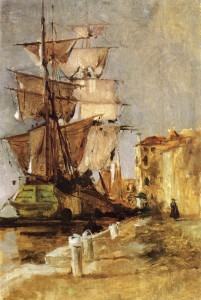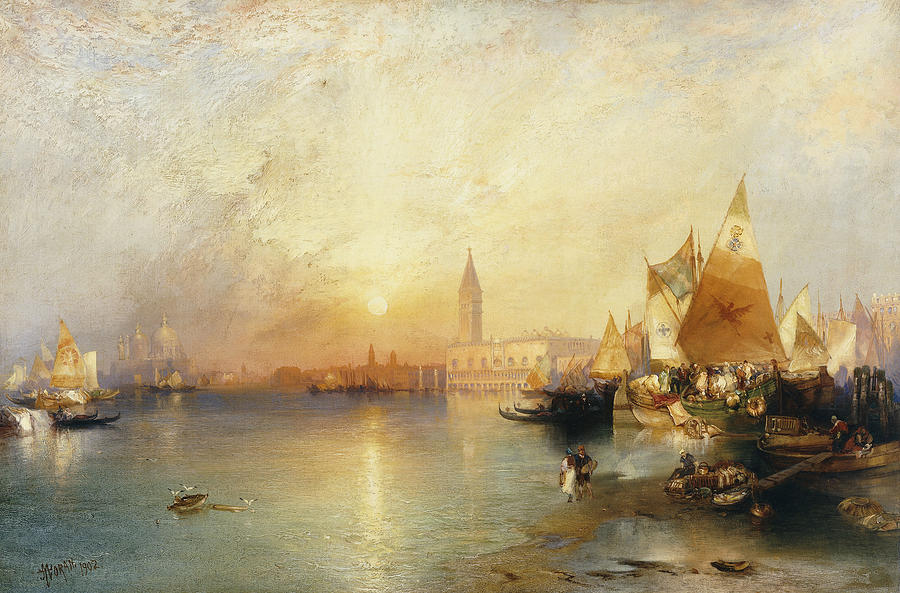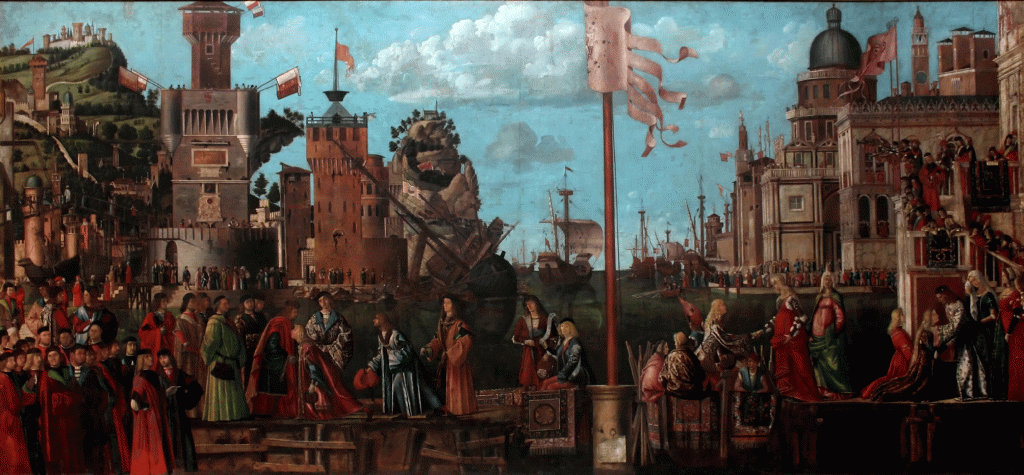ARTE CUORE, ESPRESSO. Sola andata.
storie di esuli e poeti tra roma e venezia

John Henry Twachtman, venetian sailing vessel, 1878
Questo articolo vuole mostrare come diversi tipi di linguaggio possono essere vicini tra loro, ed essere adatti a descrivere realtà diverse che però producono impressioni dello stesso tipo. L’articolo vuole essere di monito: non vi è un solo tipo di linguaggio per descrivere un evento o un’architettura o un’opera d’arte, ma un linguaggio per ogni persona. Il discorso è soggettivo.
“Sveglia e caffè, barba e bidet… presto, che perdo-il-tram”. Comincia così la mia giornata, proprio sulla soppalcata Prenestina di Fantozzi. Lotto strenuamente per un angoletto, apro anche il mio libriccino-da-viaggio: “Fondamenta degli incurabili”, di Iosif Brodskij. Ed arrivo a Termini in orario, da bravo “svizzero”. Confusione, smarrimento. Più del solito: il cancello della metro è chiuso, sciopero selvaggio… Fantozzi ha appena dichiarato “La corazzata Potëmkin” una cagata pazzesca, la macchina dei sogni si ferma, la pellicola si attorciglia su se stessa, brucia, rimane solo il caos. Sconsolato, provo ad attendere un bus sostitutivo –speranza vana- alla fermata, con l’idea di leggere, e la sensazione che presto anche Roma mi aprirà il suo cuore. Apro intanto Brodskij, poeta russo in una Venezia invernale e gelata, in compagnia dell’arte e di qualche amante:
-“Tutta la scena aveva una certa aria da fuga in Egitto: lei faceva insieme la parte della Madonna e quella del Bambino, io del mio omonimo e quella dell’asino; dopo tutto, era gennaio…” 1
 thomas moran, sunset venice
thomas moran, sunset venice
Qualcuno mi tocca il braccio: turista giapponese con cappellino e guida in mano.
“I’m solly…for the Vatican Museum?”
“Eee….today, only by a taxi…”
“Oh!.. how much?
“ I think 30 euro…the taxi stop is here”.
-“Così, mentre ti aggiri tra questi labirinti, non sai mai se insegui uno scopo o fuggi da te stesso, se sei il cacciatore o la sua preda (…) non proprio un Teseo, ma neanche un Minotauro affamato di vergini…” 2
“Scusami… hai per caso un accendino?” una ragazza, bionda, tinta forse.
“Te lo do se mi dai una sigaretta. Le ho finite”
“Ma certo! Sai per caso anche come si arriva a piedi a via Zanardelli?”
“Vedi dal mio cellulare. Mi sembra lontano!”
“Pazienza, devo andare a discutere la mia tesi!”
“Oh! In bocca al lupo allora”
“Crepi! Prendi un’altra sigaretta per dopo! Ciao!”.
-“Ci ritrovammo in una lunga galleria (…) non potevi chiedere: che cos’è questo? Chi è quello? Non potevi per l’incongruenza della tua voce, appartenente ad un organismo posteriore e ovviamente irrilevante. O forse era un viaggio subacqueo (…) e non aprivi la bocca per non far entrare l’acqua…” 3
“Senta mi ascolti un attimo!” un signore sessantenne parte in quarta: “Io devo andare a piazza Risorgimento, chiaro?”
“Limpido”
“Devo andare da un amico che non vedo da anni, ho il ritorno alle 17:00. Che devo fare?”
“Prenda lì il tram, a Porta Maggiore cambi con il 19 ed arriva, al ritorno stessa cosa”
“Bravo, prefetto. Grazie”.
-“Esiste indubbiamente una corrispondenza – se non un nesso esplicito – tra la natura rettangolare delle forme di quel pizzo – ossia degli edifici veneziani – e l’anarchia dell’acqua, che disdegna la nozione di forma. È come se lo spazio, consapevole della propria inferiorità rispetto al tempo, gli rispondesse con l’unica proprietà che il tempo non possiede: con la bellezza…” 4
“Senta giovane, va ad Ottaviano? Noi abbiamo l’ufficio tutti lì e stiamo dividendoci un taxi…”
“No. La ringrazio. Buona giornata”.
-“Dipingi, bisbiglia la luce invernale (…) non porta calore o energia (…) l’unica ambizione delle sue particelle è quella di raggiungere un oggetto e di renderlo – piccolo o grande che sia – visibile. È una luce privata, la luce del Giorgione o del Bellini, non la luce del Tiepolo o del Tintoretto (…). Un oggetto, dopo tutto, è ciò che rende privato l’infinito.” 5
“Ma come devo fare?!” urla un rotondo popolano sui cinquanta.
“È una giornataccia per tutti… posso aiutarla?”
“Purtroppo no. Devo andare al tribunale dei minori a discutere l’affidamento di mio figlio, e non ho neanche i soldi per il taxi con me” .
Questo è troppo. Le storie si sono confuse, troppo. Turisti, lavoratori, studenti, io, Brodskij, tutti stranieri esuli dalle nostre patrie ricolme di desideri e problemi, verso Venezia, o Roma, verso “la risposta”, il quid di queste città che solo un poeta alla fine riesce a descrivere:
”In breve, l’occhio è sempre in cerca di sicurezza. Questo spiega la predilezione dell’occhio per l’arte in generale, e per l’arte veneziana in particolare (…) Perché la bellezza è sollievo, dal momento che la bellezza è innocua, è sicura. (…) Nella bellezza l’occhio ha la sua pace, per parafrasare Dante.” 6
Tutti dimentichi dei nostri esili, ci smarriamo nell’arte che è la città, nello spazio e nel tempo, dentro gli edifici (dentro di noi) come nelle strade, ignorando il futuro. Perché la bellezza è gemella della speranza: può farti commettere tante imprudenze.
Sebastian Di Guardo
Da “Fondamenta degli incurabili”, di Iosif Brodskij, Adelphi 1989.
1 – pag 96
2 – pag 70
3 – pag 46-7
4 – pag 41
5 – pag 67
6 – pag 87-8

Vittore Carpaccio, Incontro dei fidanzati e partenza per il pellegrinaggio, olio su tela, 1495
ART- HEART , one way
Stories of poets and exiles, between Rome and Venice.
This article aims at showing the similarity of various languages that may describe different realities but suggest similar impressions. There is not only one language to depict an event or an architecture or a piece of art, but a language for each individual. It is subjective.
“Alarm clock, shave and shower… hurry or I won’t catch the tram”. That’s how my day begins, right on Fantozzi’s Prenestina high lane.I fight hard for a spot on the tramway and I succeed in opening my commuter-book: Quayside of the Incurables – Iosif Brodskij. And I arrive at destination on time, as a real “swissman”. Confusion and bewilderment. More than usual: the underground gate is closed, there is a strike going on… Fantozzi has just declared The battleship Potemkin is “real shit”, the dream machine stops, the film unwinds, burns and there’s just chaos left. I wander discontent and wait for a bus, reading at the bus stop and hoping that through the poems, Rome too will open its heart to me. Brodskij , a Russian poet in ice-cold Venice, with art and a few lovers:
“The entire scene looked like the flight into Egypt: she was at the same time the Madonna and the child, I was my homonymous and the honkey. It was January after all. “ 1
Someone touches my arm; a Japanese tourist with a pretty hat and an umbrella:
“I am solly… fol the Vatican Museum?”
“Weeell, today only by taxi.”
“Oh, how much?”
“I think 30 euro, the taxi stop is right there.”
“While you meander in this maze, you never know if you chase a goal or flee yourself, if your are the hunter or the hunted, not a Theseus nor a Minotaur hungry for virgins” 2
“Excuse-me do you have a lighter?” – a blond girl, maybe a fake blond, asks.
“I do, and do you have a cigarette for me? I ran out”
“Sure! Do you know how to get to via Zanardelli?”
“Let’s check on my phone, it seems far to reach by foot!”
“Doesn’t matter how far it is, I have to be there to discuss my thesis.”
“Oh! Good luck then!”
“Thanks, take another cigarette! Ciao.”
“We found ourselves in a long gallery (..) and you couldn’t ask: what is this? Who is that? Discrepancy in your voice, belonging to a posterior organism and irrelevant of course. Or maybe you were traveling underwater (..) and you didn’t open your mouth to avoid water getting in.” 3
“Hey listen to me please!” a 60 years old man asserts “ I have to go to Piazza Risorgimento ok?”
“Sure!”
“I have to meet with a friend that I haven’t seen in years and I have my train at 17:00. What should I do?”
“Well, hop on the tramway there until Piazza Maggiore, then take the 19 – another tram – and you get there. Same on the way back”
“Good. Great. Thanks”
“There obviously is a reciprocity – if not an explicit connection – between the rectangular nature of that edge – i.e. Venetian buildings – and water anarchy despising form. It’s as though space were aware of its inferiority towards time and responds with the only characteristic that time does not possess: beauty.” 4
“Listen young man, are you going to Ottaviano? We all head there and we are sharing a cab, want to come?”
“No thank you. Have a nice day.”
“Depict – whispers the winter light (…), it doesn’t warm or bring energy (…), its main ambition is hitting an object and make it visible – however big or small. It’s a private light, not the one in Giorgione or Bellini, nor the one in Tiepolo or Tintoretto (…). An object makes the infinite personal, after all.” 5
“So, what do I have to do?” shouts a chubby little man on his 50s.
“It’s a hard day for everyone, may I help?”
“No, unfortunately. I have to go to the minors Court to settle the case for my son’s custody and I don’t even have the money for a cab.”
That’s enough! The stories mixed up too much. Tourists, students, workers, me, Brodskij, all strangers and aliens, exiled from their and looking for answers. Describe the quid within. Only a poet can.
“The eye searches for security. This explains why the eye prefers art in general and Venetian art in particular. (…) Beauty is relief because beauty is harmless, it’s safe. (…) In beauty the eye finds peace, to quote Dante.”6
Oblivious of our exiles, we wilder in the art of the city, in space and time, in buildings (within ourselves) and in streets, ignoring our future. Because Beauty rimes with Hope: it makes you act silly, sometimes.
Sebastian Di Guardo
Translations by Giulia Scaglietta
From “Incurable disease”, Iosif Brodskij, Adelphi 1989 Italy
1 – pag 96
2 – pag 70
3 – pag 46-7
4 – pag 41
5 – pag 67
6 – pag 87-8
